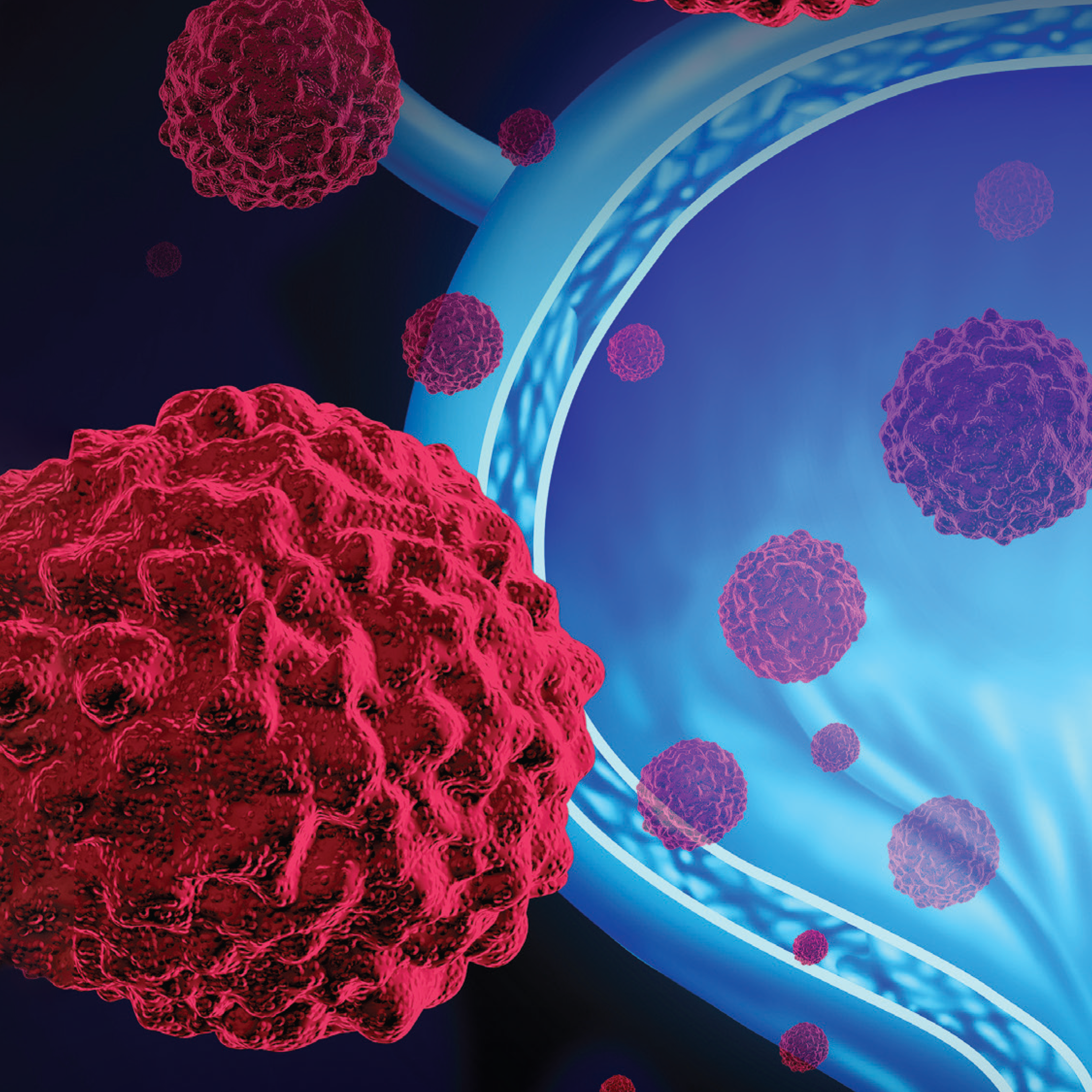Atezolizumab May Yield OS Benefit in PD-L1+ Advanced Urothelial Carcinoma
Treatment with atezolizumab monotherapy yields an acceptable toxicity profile compared with chemotherapy among those with advanced or metastatic urothelial carcinoma.
"These findings suggest that first-line atezolizumab monotherapy could be a potential treatment option for patients with locally advanced or metastatic urothelial cancer ineligible for cisplatin who have high PD-L1 expression," according to the study authors.

Frontline single-agent atezolizumab (Tecentriq) did not significantly improve survival compared with platinum-based chemotherapy overall in patients with locally advanced or metastatic urothelial carcinoma, according to final overall survival (OS) analysis findings from the phase 3 IMvigor130 trial (NCT02807636). However, data from the trial demonstrated an OS benefit with atezolizumab among patients with PD-L1–high disease compared with chemotherapy.
Data highlighted a median OS of 15.2 months (95% CI, 13.1-17.7) among patients who received atezolizumab monotherapy (group B) compared with 13.3 months (95% CI, 11.9-15.6) among those who received chemotherapy (group C; HR, 0.98; 95% CI, 0.82-1.16). Investigators noted that these findings should be considered exploratory in nature, as the prespecified statistical testing hierarchy of the study did not allow for formally comparing outcomes in group B and group C.
Among patients with a high PD-L1 expression, the median OS was 27.5 months (95% CI, 17.7-49.4) with atezolizumab vs 16.7 months (95% CI, 10.0-26.1) with chemotherapy. Additionally, the median OS among those with PD-L1–high tumors who were ineligible to receive cisplatin was 18.6 months (95% CI, 14.0-49.4) vs 10.0 months (95% CI, 7.4-18.1) in each respective treatment arm (HR, 0.56; 95% CI, 0.34-0.91).
“Based on the study design, all [OS] results from group B vs group C in this article are considered exploratory. Atezolizumab monotherapy had a better toxicity profile than chemotherapy,” the study authors wrote. “These findings suggest that first-line atezolizumab monotherapy could be a potential treatment option for patients with locally advanced or metastatic urothelial cancer ineligible for cisplatin who have high PD-L1 expression.”
In the international, partially-blinded phase 3 IMvigor130 trial, patients were randomly assigned to receive first-line atezolizumab plus platinum-containing chemotherapy in group A, atezolizumab monotherapy in group B, or atezolizumab plus chemotherapy in group C. Investigators administered atezolizumab at 1200 mg or placebo intravenously every 3 weeks; 21-day chemotherapy cycles consisted of gemcitabine at 1000 mg/m2 on days 1 and 8 plus investigator’s choice of carboplatin or cisplatin.
The trial’s co-primary end points were OS and progression-free survival in group A vs group C and OS in group B vs group C in the intent-to-treat (ITT) population. Secondary end points reported in the final OS analysis included investigator-assessed objective response rate (ORR) and duration of response (DOR).
Patients 18 years and older with locally advanced or metastatic urothelial carcinoma were able to enroll on the study. Additional eligibility criteria included having measurable disease per RECIST v1.1 guidelines and an ECOG performance status no higher than 2.
The final OS analysis included 360 patients from group B and 359 from group C, whose baseline and disease characteristics were comparable. In group B and group C, respectively, the median age was 67 years (IQR, 62-74) and 66 years (IQR, 60-73). Additionally, most patients were male (76%) and White (74%).
In the ITT population, the ORR was 24.2% (95% CI, 19.9%-29.0%) in group B vs 44.4% (95% CI, 39.2%-49.7%) in group C. In each respective group, the median DOR was 29.6 months (95% CI, 15.9-not evaluable [NE]) and 8.1 months (95% CI, 6.3-8.5).
Among patients with PD-L1–high disease who were ineligible to receive cisplatin, the ORR was 40.0% (95% CI, 26.4%-54.8%) with atezolizumab monotherapy vs 32.6% (95% CI, 19.1%-48.5%) with chemotherapy. Investigators reported a median DOR of NE (95% CI, 7.2-NE) and 6.2 months (95% CI, 4.2-10.9) in each respective arm.
In group B and group C, respectively, 61% and 96% of patients experienced any-grade treatment-related adverse effects (TRAEs), 46% and 50% had serious AEs (SAEs), and 9% and 34% had AEs leading to treatment discontinuation. The most frequent grade 3/4 TRAEs in each respective treatment arm included anemia (1% vs 34%), neutropenia (less than <1% vs 30%), neutrophil count decreases (0% vs 24%), and platelet count decreases (less than <1% vs 24%).
One instance each of pneumonia, interstitial lung disease, and large intestinal obstruction resulted in treatment-related deaths among 3 patients who received atezolizumab. Additionally, a single event each of diarrhea, febrile neutropenia, toxic hepatitis led to treatment-related deaths in 3 patients who received chemotherapy; another patient in this arm had died to unexplained toxicity.
Reference
Bamias A, Davis ID, Galsky MD, et al. Atezolizumab monotherapy versus chemotherapy in untreated locally advanced or metastatic urothelial carcinoma (IMvigor130): final overall survival analysis from a randomised, controlled, phase 3 study. Lancet Oncol. 2024;25:46-61. doi:10.1016/S1470-2045(23)00539-9